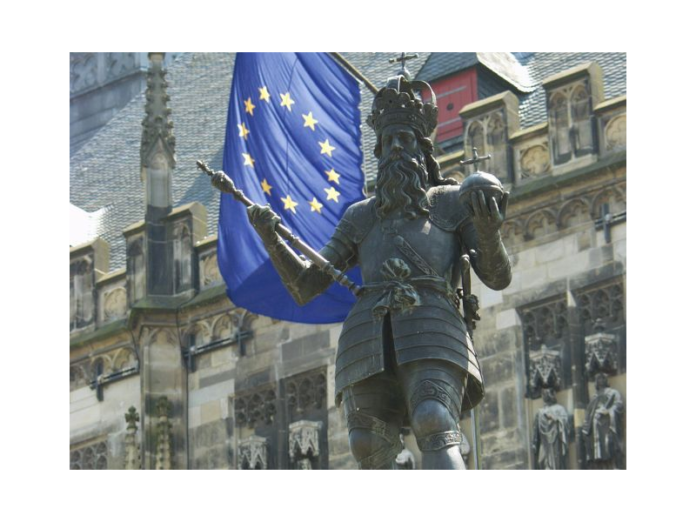Summary
On 6 May 2016 Pope Francis held an address in Sala Regia at the occasion of the conferral of the Charlemagne Prize that he was awarded.
He expresses in this address his intention to offer the prestigious award for Europe. He points out that the founders of the European project laid the foundations for a bastion of peace, an edifice made up of states united not by force but by free commitment to the common good and a definitive end to confrontation. But their new and exciting desire to create unity seems to be fading. According to the Pope we, heirs of their dreams, are tempted to yield to our own selfish interests and to consider putting up fences here and there. He recalls his address to the European Parliament in 2014 when he used the image of Europe as a grandmother. He noted then that there is a growing impression that Europe is weary, aging, no longer fertile and vital, that the great ideals that inspired Europe seem to have lost their appeal. There is an impression that Europe is declining, that it has lost its ability to be innovative and creative, and that it is more concerned with preserving and dominating space than with generating processes of inclusion and change. The Pope observes an impression that Europe is tending to become increasingly ‘entrenched’. Instead Europe is called to be the mother who generates processes (cf. Apostolic Exhortation Evangelii Gaudium, 223).
The question of the Pope is: What happened to you, the Europe of humanism, the champion of human rights, democracy and freedom? According to the Pope we need to remember, to take a step back from the present, to listen to the voice of our forebears and this will help us not to repeat our past mistakes ( cf. Evangelii Gaudium, 108). To this end, we would do well to turn to the founding fathers of Europe. They were prepared to pursue an alternative and innovative path in a world scarred by war; they were heralds of peace and prophets of the future.
The Pope points to the work of Erich Przywara, The Idea of Europe, that stresses the importance of the capacity to integrate and the danger of exclusion that leads to vulgarity, narrowness, and cruelty. The Pope also underlines the importance of the capacity for dialogue that enables us to view others as valid dialogue partners, to respect the foreigners, the immigrants, and people from different cultures as worthy of being listened to. We also need the capacity to generate. This means that everyone, from the smallest to the greatest, has an active role to play in the creation of an integrated and reconciled society. The Pope asks himself the question: How can we involve young people in the building project of Europe if we fail to offer them employment, dignified labor that lets them grow and develop through their handiwork, their intelligence and their abilities?
Finally the Pope encourages, like his predecessors, to move to a social market economy. To the rebirth of Europe weary, yet still rich in energies and possibilities, the Church can and must play her part by the proclamation of the Gospel. With mind and heart, with hope and without vain nostalgia, like a son who rediscovers in Mother Europe his roots of life and faith, the Pope dreams of a new European humanism. He dreams of a Europe that cares for children, for the infirm and elderly, for families. Of a Europe that promotes and protects the right of everyone, without neglecting its duties towards all, a Europe of which it will not be said that its commitment to human rights was its last utopia.
CONFERRAL OF THE CHARLEMAGNE PRIZE ADDRESS OF HIS HOLINESS POPE FRANCIS


